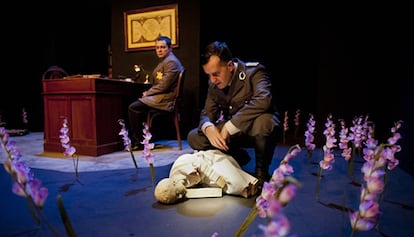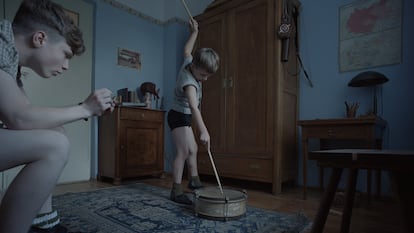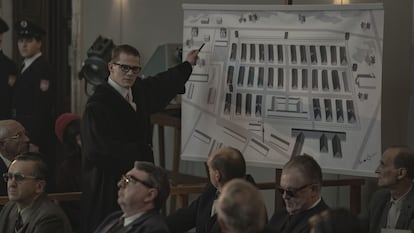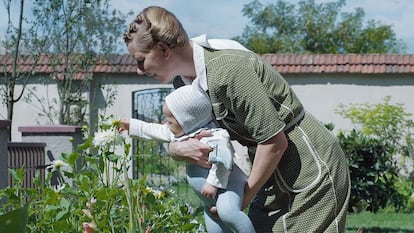A movie with a Nazi’s view of the Holocaust
Jonathan Glazer’s ‘The Zone of Interest’ is a World War II story about daily life at Auschwitz from the German commander’s perspective


Millions of human beings were executed in Nazi Germany. Many people witnessed the Holocaust and chose to ignore or deny it. The Nazi extermination camps posed a logistical challenge that required infrastructure and a bureaucracy to undertake. They required people to perform their gruesome tasks and then go back home to their loved ones at night. How did they become capable of committing these crimes? Books and movies often focus on victims, but others explore the executioners’ daily lives. Jonathan Glazer’s The Zone of Interest depicts the horrors of Auschwitz through the perspective of the commander’s family, whose mansion was located next to the camp wall. While they couldn’t see into the camp, they were exposed every day to its sounds and smells. Glazer, who won the Grand Jury Prize at Cannes for his film, adapted Martin Amis’ novel of the same name. Other productions in the same vein include the TV miniseries The Interpreter of Silence (Disney+), based on Annette Hess’ novel The German House. It explores the trial in the 1960s of 20 commanders of an extermination camp in Frankfurt. Are these portrayals legitimate? Are they moral? How does one even approach characters such as these?
There are hundreds of documentaries and movies about the Nazi horror: Life is Beautiful, Sophie’s Choice, The Boy in the Striped Pajamas, The Boys from Brazil, and The German Doctor are a few of the most famous productions. But the daily lives of Nazis have seldom been depicted on screen. Downfall provides a glimpse, but The Zone of Interest delves into it with much more detail.

Jonathan Glazer, a director with just four features in his filmography, reveals that he has been thinking about the subject for a long time. “I’m Jewish — I grew up in a family of practicing Jews.” The filmmaker told EL PAÍS at the 2023 San Sebastián festival that seeing images of the Kristallnacht (Night of Broken Glass, in English) vandalism made a big impression on him as a child. “I saw people who looked like me, my father and my relatives sweeping up the shattered windows in their shops. As a child, I didn’t grasp the situation, but it left me unsettled. The same sense of unease was shared by onlookers who stood by without intervening or offering help. Why this passivity?” Glazer began to search for “a small corner of history to depict these events on screen in a way that hadn’t been done before.”
In 2014, Glazer read a review of Martin Amis’ novel, The Zone of Interest, and immediately sought to buy the rights. “He [Amis] had the courage to tell that story. The commander character he created is fictional, but I went on a long journey researching real people for the film.” That’s why the film features the authentic names of the protagonists: Auschwitz commander Rudolf Höss and his wife, Hedwig.

Others like the award-winning Spanish playwright Juan Mayorga have undertaken this journey in plays such as The Cartographer and Himmelweg. “When a creator is faced with characters like this, one question that comes to mind is how can we understand them, to some extent, without justifying or legitimizing them? It’s not just about the aesthetics, it’s also about politics and morality, and respecting the memory of their victims,” said Mayorga. “We should not water down the tragedy of the victims or treat them superficially. But if you present what happened as an unfathomable mystery, viewers won’t be able to relate. If you approach it as an investigation, you’ll reveal common traits, tendencies and gestures that connect people with the characters.”

“The people accountable for the genocide were human beings who later became monsters. I want viewers to feel a connection, even if it’s subconsciously, with that family,” said Glazer. Like the Höss family in the movie, whose children play with macabre objects from the crematoriums and close their windows to keep the ash out. Every day they listen to the machinery of the Holocaust and the heartbreaking screams of those about to die. “Let’s be honest. Nobody is born a mass murderer, but it’s the gradual progression of passivity and the desire for acceptance that leads them down that path. And this is still happening today,” said Glazer.

Alberto Sucasas, an author, philosophy professor and expert in Jewish tradition, said, “Literature has gone further down this path than cinema. Like The Kindly Ones by Jonathan Littell. I think it’s very necessary.” Why the reluctance? “Because of this moral trap where we tend to think that when we sympathize with the victim, we must view the perpetrator as someone completely detached from the human experience. It gives us a sense of comfort, but it also helps us avoid an unsettling question: If regular people faced abnormal circumstances, would they resort to such extremes? It makes people wonder, what would I do in that situation?” The same question is raised in The Interpreter of Silence TV series. A young man confesses to ejaculating while beating someone to death with a stone, and experiences such intense rage that he turns into someone like the Nazis, which ultimately leads to his downfall.

Sucasas says this kind of fear always leads to some kind of cover-up. “Witnesses play a crucial role in transmitting the news of the perpetrated evil. This is most evident in the words of survivors from the Nazi camps. While we are appropriately captivated by the witness-victim’s testimony, we have overlooked the essential role of the victimizer, despite the potential insight hidden in their psyches.” Mayorga believes artists need to dive deep into that morass. “Let’s face the fire, let’s take a look at the executioner. If something makes you wonder if there’s a hint of fascism within you, then we’re on the right track. That’s powerful. To embark on that journey, we need to understand the people behind it. Painting them as a monster is a tempting way to simplify things, but it’s important to acknowledge whether a different outcome was ever feasible.”

Albert Speer, Hitler’s architect, portrayed himself as a good and contrite Nazi. Actor Pep Munné played the architect in a theater production of Speer. “I was thinking about how he deceived himself with his justifying arguments. That’s how Speer managed to survive and write his diaries.” Munné had an advantage in understanding the character he played. “The truth about Speer came out after he died in 1981 and his lies started to crumble. That’s how I know who he really was and that he even proposed building an atomic bomb to Hitler. Then he went on to spin his own version of events.” But on stage, “you have to believe the lies to make it as convincing as possible,” said Munné.
Nobody is born a mass murderer, but it’s the gradual progression of passivity and the desire for acceptance that leads them down that path. And this is still happening todayJonathan Glazer
French filmmaker Claude Lanzmann, best known for Shoah documentary film (1985), an exhaustive oral history of the Holocaust, disagreed with attempts to understand the why of Hitler and Nazism, stating that such evil cannot or should not be explained. “Avoiding this type of exploration hinders our understanding of the parallels we see today,” said Glazer. “I didn’t want to create an aloof museum piece, disconnected from the audience. We mustn’t forget humanity’s incredible capacity for committing aberrant crimes, whether actively or passively. It’s dangerously easy to go down that path.”
Sign up for our weekly newsletter to get more English-language news coverage from EL PAÍS USA Edition
Tu suscripción se está usando en otro dispositivo
¿Quieres añadir otro usuario a tu suscripción?
Si continúas leyendo en este dispositivo, no se podrá leer en el otro.
FlechaTu suscripción se está usando en otro dispositivo y solo puedes acceder a EL PAÍS desde un dispositivo a la vez.
Si quieres compartir tu cuenta, cambia tu suscripción a la modalidad Premium, así podrás añadir otro usuario. Cada uno accederá con su propia cuenta de email, lo que os permitirá personalizar vuestra experiencia en EL PAÍS.
¿Tienes una suscripción de empresa? Accede aquí para contratar más cuentas.
En el caso de no saber quién está usando tu cuenta, te recomendamos cambiar tu contraseña aquí.
Si decides continuar compartiendo tu cuenta, este mensaje se mostrará en tu dispositivo y en el de la otra persona que está usando tu cuenta de forma indefinida, afectando a tu experiencia de lectura. Puedes consultar aquí los términos y condiciones de la suscripción digital.








































